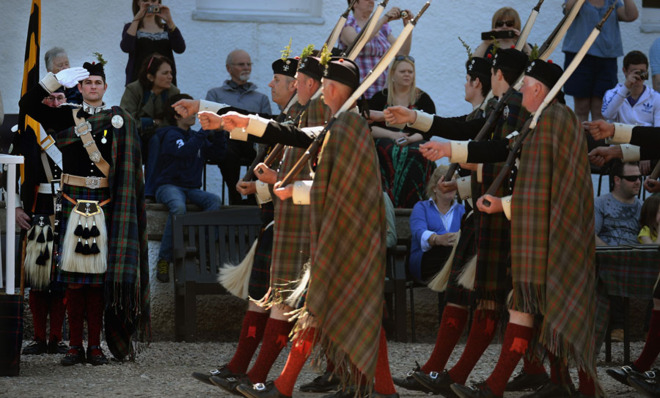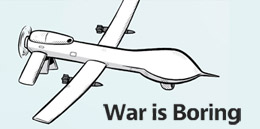An independent Scotland will need its own army, navy, and air force — and that could be a problem
There is likely be some very hard-nosed bargaining between Edinburgh and London

A free daily email with the biggest news stories of the day – and the best features from TheWeek.com
You are now subscribed
Your newsletter sign-up was successful

Today, voters in Scotland are deciding whether to remain within the United Kingdom. Scottish sovereignty rides on two things: any eventual negotiations between London and Edinburgh and the gradually evolving position of the Scottish National Party, the primary backer of the independence bid.
And if it happens, the resulting military reform is going to be a mess. If the vote is yay, the most optimistic date for negotiations is March 2016, but it isn't out of the question that sticking points could push this back. Defense could be one of those points.
In its white paper on a newly independent Scotland, the SNP lists the potential new country's needs in its first 10 years. The paper calls for an annual military budget of around £2.3 billion — $4.1 billion — with a standing army, navy, and air force with 15,000 personnel.
The Week
Escape your echo chamber. Get the facts behind the news, plus analysis from multiple perspectives.

Sign up for The Week's Free Newsletters
From our morning news briefing to a weekly Good News Newsletter, get the best of The Week delivered directly to your inbox.
From our morning news briefing to a weekly Good News Newsletter, get the best of The Week delivered directly to your inbox.
It also declares that existing Scottish regiments would carry on their names, identities, and traditions — and that those lost in previous defense re-organizations would be brought back.
Scotland would reposition its defense posture towards patrolling the coast, the North Atlantic and the North Sea, and defending its maritime assets — specifically fishing grounds and oil. Scotland hopes to acquire 12 Eurofighter Typhoons from the Royal Air Force, two frigates from the Royal Navy's current fleet, and several offshore patrol vessels such as the current Riverclass being built for the U.K. by BAE systems.
An independent Scotland would seek membership in NATO. It would also require that all nuclear weapons be removed from Scottish territory as soon as possible.
If you detect contradiction in those last two tenets, it means you're paying attention. An independent Scotland would join a military alliance whose security is explicitly underpinned by a tri-nation nuclear umbrella provided by the United States, the U.K., and France while at the same time enforcing its own nuclear-free zone.
A free daily email with the biggest news stories of the day – and the best features from TheWeek.com
This could lead to problems.
Better under the umbrella than out?
In 1951, United States brought Australia and New Zealand within its nuclear umbrella as part of a larger military alliance known as ANZUS.
In 1985, New Zealand responded to repeated French nuclear tests in the South Pacific by declaring New Zealand nuclear-free. David Lange, the prime minister at the time, banned all nuclear-powered or nuclear-armed ships from docking at New Zealand ports or even entering national waters.
The policy became law in 1987 with the passing of the New Zealand Nuclear Free Zone, Disarmament and Arms Control Act — but the impact was already being felt. The Reagan administration in the U.S. made it clear that if New Zealand did not back down then Washington would be forced to suspend its ANZUS treaty obligations to New Zealand.
In effect, New Zealand had been kicked out from under the atomic umbrella. It's not inconceivable that the same thing could happen to Scotland.
At present, the U.K. operates four Trident nuclear submarines from Clyde, situated in Scotland's deep-water port of Faslane in Argyll and Bute.
Under independence, the status of Faslane would immediately become unclear. One thing that Scotland has that England doesn't is decent deep-water facilities which also have the required remoteness and access to the Atlantic that a nuclear sub force really needs.
This could pose a substantial problem in any negotiation over the final status of U.K. forces in Scotland. London is intent on keeping the nuclear deterrent in Faslane while the SNP is intent on imposing its nuclear-free zone.
And no agreement over the final status of the U.K. nuclear deterrent could jeopardize Scotland's application to NATO.
In a meeting between the Scottish government and NATO officials, this was apparently made clear. Scotland "can't apply to join NATO and then disregard the fact that it is a nuclear alliance," Scottish Secretary Michael Moore insisted.
Lord George Robertson, a former NATO secretary general, went further. "It's a confidence trick both on their membership and the Scottish people," he said of the SNP's self-defeating planning.
Changing tack
There is a delicate dance underway in the SNP to shift the atomic policy. Alex Salmond, Scottish First Minister and leader of the SNP, outlined the shift in November. He pointed to the example of Denmark and Norway — both NATO members and both also able to exercise a sort of partial nuclear-free zone by banning nukes but declining to strictly enforce the ban.
A similar compromise would allow NATO nuclear-armed vessels to enter Scottish territorial waters "without confirming or denying whether they carry nuclear weapons," Salmond said. Ignorance, in other words, would be bliss for anti-atomic Scotland.
The U.K. government has also allegedly been changing strategy. Government figures have had to deny reports that there are moves underway to declare Faslane as sovereign U.K. territory in the style of the U.K.'s so-called "treaty ports" that existed in Ireland after it was granted home rule.
In Scotland, pro-independence campaigners are hostile to such a move, calling it a "preposterous threat."
In reality, though, the debate masks what would likely be some very hard-nosed bargaining between Edinburgh and London. The SNP knows that the status of Faslane is important in getting concessions from the U.K. It also knows that it would take the U.K. a long time to build an alternative to Faslane.
"The nuclear bases are powerful bargaining chips for Scotland," says Prof. Malcolm Chalmers of the Royal United Services Institute. The SNP, Chalmers adds, "would only surrender or dilute [demands for bases' closure] in return for other concessions from the U.K."
An agreement could be similar to one between the U.K. and the Irish Free State in 1921. It would ensure that the U.K. could still use Faslane … until an alternative could be constructed. Salmond's subtle shift is indicative of this gradually evolving compromise. "One day — perhaps by 2030 — the bases could move to England," Chalmers explains.
A question of security
Scottish independence could rekindle traditional English fears of either subversion, terrorist attack, or outright invasion by a foreign power through Scotland.
These fears have been heightened by recent foreign incursions, including Russian bombers flying into U.K. airspace via the North Sea and, more recently, by a Russian navy task force sailing into the Moray Firth — prompting the Royal Navy to dispatch the Type 45 destroyer HMS Defender on a 600-mile, 24-hour run up the U.K.'s east coast to confront the Russian ships.
However, there is much to suggest that the incursions have become more dangerous because of the U.K.'s own military cuts. Today the U.K. has only three major naval dockyards — one in Scotland housing the nuclear deterrent and two in England's southwest. The RAF's presence in Scotland is being drawn down and with the scrapping of the Nimrod fleet, the U.K. has no airborne maritime patrol capability at all.
The yes camp can therefore reasonably point out that if an independent Scotland made reasonable defense investments, it would be more than capable of protecting NATO — and the U.K.'s — northern flank. British security might actually improve after Scottish separation. Acquiring a proper maritime patrol capability alone would plug a huge existing gap.
An independent Scotland could end up being a respectable European nation and NATO member. Something a diminished U.K. surely could live with.
Team player
The white paper plots out a possible gradual expansion of Scottish defense, with a NATO-compatible airspace command and control system, and an additional four Typhoon jet fighters on top of the initial 12.
Scotland's maritime capability could also be expanded with two new frigates and extra offshore patrol vessels. The new country would also invest in an efficient, low-cost maritime patrol plane. The American P-3 Orion has been mentioned as a candidate.
These additions would give Scotland some of the same capabilities and capacity that smaller NATO members such as Norway possess.
But there are doubts that an independent Scotland could afford these forces on a budget of just £2.3 billion a year. The U.K. Defense Select Committee found that planes for a Scottish air force alone could cost up to £1.7 billion annually.
Cost overruns for new equipment such as new frigates and patrol vessels could conceivably occur, as the Scottish civil service will initially lack experience with weapons procurement. It has been pointed out that Scotland would have to look abroad for any new ships — which could only increase that risk.
But these fears assume that extra capabilities would be purchased either immediately or in the short term. The reality is that any new Scottish defense procurement would be carried out over a period of many years — time to grow a competent bureaucracy and increase the budget.
Scotland would most likely not be alone in trying to stand up its own Ministry of Defense and could probably count on assistance from the U.K. and other NATO members. "It would take time to develop," Chalmers notes. "Others — e.g. Denmark and Norway — might be asked to second experts."
Of course, as the clock ticks down to the vote, all discussion about possible defense and procurement policy is mere speculation. Perhaps the people of Scotland will vote against a split or maybe the SNP will win the battle for independence but lose the electoral war at home, putting a different party in charge on independence day.
From drones to AKs, high technology to low politics, War is Boring explores how and why we fight above, on, and below an angry world. Sign up for its daily email update here or subscribe to its RSS Feed here.
More from War is Boring...
-
 The ‘ravenous’ demand for Cornish minerals
The ‘ravenous’ demand for Cornish mineralsUnder the Radar Growing need for critical minerals to power tech has intensified ‘appetite’ for lithium, which could be a ‘huge boon’ for local economy
-
 Why are election experts taking Trump’s midterm threats seriously?
Why are election experts taking Trump’s midterm threats seriously?IN THE SPOTLIGHT As the president muses about polling place deployments and a centralized electoral system aimed at one-party control, lawmakers are taking this administration at its word
-
 ‘Restaurateurs have become millionaires’
‘Restaurateurs have become millionaires’Instant Opinion Opinion, comment and editorials of the day